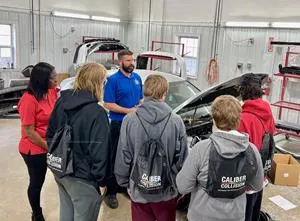
Caliber, national nonprofits & AAG working to recruit, train new generation of technicians
By onEducation
The Caliber family of brands, alongside nonprofits TechForce Foundation and Learning Undefeated, have launched a pilot program to introduce high school students to the collision repair industry.
Throughout the pilot, which began in October and lasts through this month, students in Maryland and Texas learn about Caliber’s Technician Apprentice Program (TAP) and participate in hands-on experiences in a live shop environment with Caliber auto body technicians. They’re also going on tours, getting one-on-one demos, and participating in timed assembly challenges, remote control car racing, and more.
The entire automotive industry, including collision repair, has been grappling with a shortage of technicians for years that, according to TechForce, reached 232,000 in 2021. In collision alone, the demand was 35,000 techs while only 4,500 graduated. That makes programs like TAP and others more important than ever to recruit young talent.
TechForce and Learning Undefeated are participating in Caliber’s pilot program through the “Collision Career Pit Stop” event series, which includes hands-on demonstrations and general educational content about collision repair technician careers.
Repairer Driven News asked Caliber for more details on what TAP specifically teaches technicians in training. They said apprentices learn the latest in automotive technology advancements, such as advanced driver assistance systems (ADAS); experience a safe and engaging work environment using state-of-the-art equipment and quality materials; and receive company-paid collision repair certifications, such as those offered through I-CAR.
Technical training includes:
-
- Repair planning and safety practices;
- Replacement and alignment of bolt-on panels;
- Plastic bumper and steel panel repair;
- Disassembly and reassembly of parts, trim and hardware;
- Corrosion protection, seam sealing and foams replacement;
- MIG welding and spot welding on steel panels;
- Removal and replacement of weld-on panels;
- Frame set-up and light sheet metal structural pulls; and
- Electrical and mechanical repair basics.
Although TAP is a proprietary Caliber training program, TechForce Chief Marketing and Strategy Officer Mike Pressendo told RDN companies that support the nonprofit’s charitable mission have access to its social network, which includes more than 15,000 next-gen technicians that are active in the community.
“Those companies can promote internships and apprenticeships via our community and that is where students sign up for these opportunities as well as the more than $1.5 million in scholarships we award annually,” he said. “Part of the benefit to supporting TechForce is that we have relationships with hundreds of schools and thousands of students who look to us to connect them with these types of opportunities and experiences.”
TechForce CEO Jennifer Maher said the partnership with Caliber and Learning Undefeated “is a great way to leverage the expertise of our complementary nonprofits combined with Caliber’s commitment to workforce development.”
“Using our techforce.org platform to promote and engage students, together, we’re introducing them to rewarding careers in collision repair, while leaving a lasting imprint on our communities,” she said.
Caliber President and CEO Mark Sanders said the company is “committed to inspiring all teammates to reach their full potential.”
“Through our Technician Apprentice Program, we are influencing the next generation of auto body techs and helping students achieve their goals, as well uncover career opportunities, which they may not have previously considered, within Caliber’s supportive culture,” he said. “We are excited to leverage this partnership to expose even more students, teachers, and parents to Caliber and TAP.”
Learning Undefeated CEO Brian Gaines added that “there’s power in numbers, and this partnership will benefit thousands of students.”
“Hands-on learning experiences help open students’ eyes to career possibilities and build excitement about the high-demand field of collision repair,” he said.
Another recruitment and training effort underway is Automotive Apprentice Group (AAG)’s apprenticeships in which apprentices are compensated at a competitive wage and have no out-of-pocket expenses for training. The program recently expanded to the Dallas-Fort Worth area of Texas to address the technician shortage there. An estimated 30% of Dallas-Fort Worth auto service bays are going unused because of a lack of service technicians and nearly 2,000 technician job openings are posted on area job recruitment sites, according to AAG.
Through the program, AAG matches auto dealership and truck center operations with area residents for two years of hands-on training and a U.S. Department of Labor certification upon completion.
AAG initially launched in Louisville, Kentucky then expanded to Cincinnati and Indianapolis. Jobs that apprentices land after completing the program pay, on average, an initial annual salary of nearly $65,000.
“The fundamental premise of the Australian apprentice model, and certainly of AAG, is straightforward,” said AAG President Joe Atkinson. “It’s connecting career-minded people such as recent high school graduates or those currently working unrewarding jobs with career opportunities in need of motivated, skilled people. The key to success is taking a holistic approach to the challenges of identifying, vetting, teaching, hiring, and retaining good, long-term, committed career technicians.”
To learn more, visit aagamerica.com.
Images
Featured image: Combining the resources of Caliber Collision centers and Learning Undefeated’s Mobile eXploration Lab (MXLab), Maryland students watch one-on-one demos and interact with experienced Caliber auto body technicians in a live shop environment. (Credit: Caliber)
More information
2022 TechForce supply & demand report: More than 100K collision techs needed over next four years
